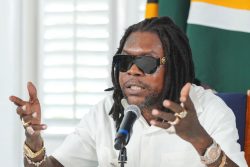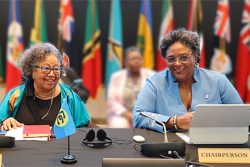Dear Editor,
I am more than slightly appalled by the pronouncements attributed to Dr David Dabydeen in the article, ‘Dabydeen says Caribbean Press faces human resource crisis’ (SN, May 14), regarding the incompetence and laziness of local writers, and the absence of anyone here competent enough to run the Caribbean Press. I humbly suggest that Guyana’s Permanent Representative to UNESCO and Ambassador to the People’s Republic of China adopt a far more diplomatic tack in his interaction with the media in the future. More important in my view however is the insight into precisely how the Press is run, a policy clearly influenced by Dr Dabydeen’s bleak perspective on the paucity of intellectual capital here, a perspective no doubt jaundiced by the closeness of his relations to Freedom House.
In January, we learnt from Dr Dabydeen the Press was in the process of publishing, inter alia, “a poetry anthology (at the printers) featuring 22 local Guyanese writers, most of them never published before, and at least two who show serious talent and should be encouraged to produce full volumes. These will be launched publicly when I am next in Guyana, as well as a book by Cedric Costello, entitled Rasta Lyrics, an anthology of Guyanese folksongs, and an anthology of Guyanese short stories.” (SN, Jan 15) Yet, in May, we hear that local writers are “poor in quality and lazy” and “producing mostly dross.”
Also in his January correspondence, Dr Dabydeen spoke glowingly of the prospects of growth for the Press, stating, “I expect that the series will grow over the years since it can easily accommodate 100 titles.” In May, we learn that “the Press will either die completely, or else do the odd book.”
On the issue of the alleged absence of local competence to run the Caribbean Press, Ameena Gafoor is but one example of someone who could easily handle such an endeavour. So is Myrtle Chuck-A-Sang, who – with a skeleton staff that included yours truly as editorial consultant – ran the UWI-Caricom Project for the better part of a decade, producing dozens of quality publications on the regional integration process as well as one documentary video. Sandra Granger, the silent but active management and editorial partner behind David Granger’s Guyana Review in its earlier incarnation, would also provide more than competent directorial service.
In saying that he personally decides who is published, as opposed to an editorial board, Dr Dabydeen contradicts himself when he wrote in January that, “we repeat that the Caribbean Press is a peer-reviewed press.” The absence of an editorial board, Dr Dabydeen’s sterling credentials notwithstanding, is not standard practice anywhere, even here. Indeed, Dr Dabydeen is, for example, one of twelve persons listed as editorial advisors for the locally published Arts Journal, the editor and de facto publisher being Ms Gafoor.
In contrast, Elly Niland’s Collected Poems, published by the Caribbean Press, has editorial credits listing just David Dabydeen and Lynne Macedo as “General Editors”, with Ian McDonald listed as “Consulting Editor.”
Which leads me to what passes for the editorial policy of the Press. For example, fellow Guyana Prize winner, the affable and charming Niland – sister of Dr Dabydeen – has had the aforementioned publication produced under the Guyana Classics Library series. This is puzzling since Niland, having won the Poetry prize in 2006, would be considered a contemporary writer, and publication in the series would be contrary to the rationale given for the Classics, ie, the reprinting of out-of-print books of high historical or literary value. Even were one to make the dubious case that Niland’s prize-winning work was both out of circulation and of exceptional literary or historical value, the fact is, her Cornerstones not her Collected Poems won the Prize. In short, Dr Dabydeen, with the help of Macedo and McDonald would have put together an entirely new collection of poems written by Dabydeen’s sister, dubbed it an instant classic, and used the Caribbean Press to produce it. It should be noted that the Guyana Classics Series has not produced any work on or by Martin Carter.
The implications for this go far beyond the issue of mere publication, as damning as that already is in itself. For example, were any of the writers thus selected to be published by the Caribbean Press to submit their work to the Guyana Prize for Literature, these books would be in competition with the hard-wrought manuscripts of local writers.
Which brings me to the issue of the “laziness and incompetence” of locally resident writers. I have in my apartment several manuscripts and self-published books by local writers. One manuscript is by William Samuel Bremner, simply titled Poems, written by a man who has spent at least a decade as a homeless self-confessed drug addict, yet who walks around composing poems of mediocre but yet commendable quality not unlike Rasta Lyrics, published by the Press. Snatches of Life is a recent self-publication of Mr Neil Primus, a former Catholic monk. New Writing Today From Guyana, edited by Terrence Roberts, contains fiction and poetry by Roberts, Mosa Telford, Delana Isles, Gentian Miller, Rene Chester, Syble Douglas, Kojo McPherson, Edison Jefford, Mark McWatt and yours truly. Multilateral Diplomacy for Small States was launched earlier this year by legendary Guyanese diplomat Rudy Insanally. While Mr Primus used Xlibris to publish his work, the latter two books were produced entirely in Guyana, including quality printing by local printers.
The irony is, I asked several promising local writers whether they have any work included in the anthologies of contemporary Guyanese poetry and short fiction, allegedly edited by Petamber Persaud and published by the Caribbean Press and they all said no. I await the promised launch of these and other publications as promised by Dr Dabydeen in his letter earlier this year defending the decision to publish the book written by the Minister of Culture Frank Anthony’s daughter.
Which raises another issue. Let us presume that the only new writer of such alarmingly good quality as to be published by the Press – the only local young person with literary ambitions in all of Guyana who is not both lazy and incompetent – just happened to be the Minister’s daughter; this makes the case I’ve been making for the past thirteen years, which is, that no amount of government support in literature can be absent developmental mechanisms benefiting local writers.
There is much more that can be addressed with regard to Ms Alleyne’s enlightening article, but in closing I will finally focus on the issue of the offered editorship of the Press. I’ve privately indicated to Dr Dabydeen, my willingness to take up the post of executive or consulting editor to the Caribbean Press; my only conditions are fair remuneration and the latitude to operate professionally under the policy direction of a board that includes but is not dominated by government representation. I already have a draft white paper for the reform of the Press which includes, inter alia, suggestions for a resident board of directors and an international editorial advisory board; a potential location for the Caribbean Press; and a two-year plan of action that covers publication policy, management, marketing, research, and training and development. A summary of these initiatives has also been sent to Dr Dabydeen.
The Caribbean Press has the potential to situate Guyana as a critical hub of creative industry in the Caribbean and once partisan politics and the need for a domineering bureaucratic control are removed from the dynamic, it can function as thus, and to the credit – strangely enough – of the government of the day.
Yours faithfully,
Ruel Johnson









